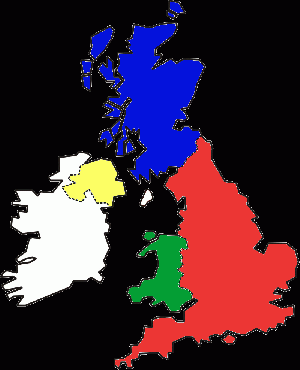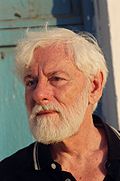
United Kingdom
(Image by (From Wikimedia) Finn Bjørklid; Kjetil Ree, Author: Finn Bjørklid; Kjetil Ree) Details Source DMCA
Two countries competed this week for first place in news programs all over the world: Scotland and the Islamic State in Iraq and Syria.
There could not be a greater difference than between these two countries. Scotland is damp and cold, Iraq is hot and dry. Scotland is called after its whisky (or the other way round), while for ISIS fighters, drinking alcohol is the mark of unbelievers, who should lose their head (literally).
However, there is one common denominator of both crises: they mark the approaching demise of the nation-state.
MODERN NATIONALISM, like any great idea in history, was born out of a new set of circumstances: economic, military, spiritual and others, which made older forms obsolete.
By the end of the 17th century, existing states could no longer cope with new demands. Small states were doomed. The economy demanded a safe domestic market large enough for the development of modern industries. New mass armies needed a base strong enough to provide soldiers and pay for modern arms. New ideologies created new identities.
Britanny and Corsica could not exist as independent entities. They had to give up much of their separate identity and join the large and powerful French state to survive. The United Kingdom, the union of the British isles under a Scottish king, became a world power. Others followed, each at its own pace. Zionism was a late effort to imitate this.
The process reached its peak at the end of World War I, when empires like the Ottoman Caliphate and Austria-Hungary broke up. Kemal Atatà �rk, who exchanged the Islamic caliphate for a Turkish national state, was perhaps the last great ideologue of the national idea.
But by that time, this idea was already growing old. The realities which had created it were changing rapidly. If I am not mistaken, it was Gustave Le Bon, the French psychologist, who asserted a hundred years ago that every new idea is already obsolete by the time it is adopted by the masses.
The process works like this: somebody conceives the idea. It takes a generation for it to become accepted by the intellectuals. It takes another generation for the intellectuals to teach the masses. By the time it attains power, the circumstances that gave it birth have already changed, and a new idea is required.
Reality changes much more quickly than the human mind.
Take the idea of the European nation-state. When it reached its final victory, after the Great War, the world had already changed. European armies, which had mown each other down with machine guns, were facing tanks and warplanes. The economy became world-wide. Air travel abolished distances. Modern communication created a "world village".
In 1926 an Austrian nobleman, Richard Coudenhove-Kalergi, convened a pan-European congress. While Adolf Hitler, a hopelessly old-fashioned thinker, tried to impose the German nation-state on the continent, a small group of idealists propagated the idea of a European Union, which spread after another dreadful World War.
This idea, now still in its infancy, is generally accepted, but it is already obsolete. The multinational economy, the social media, the fight against deadly diseases, the civil wars and genocides, the environmental dangers threatening the entire planet -- all these make world governance imperative and urgent -- yet this is an idea whose realization is still very, very far away.
THE OBSOLENCE of the nation-state has given birth to a paradoxical by-product: the breakup of the state into smaller and smaller units.
While the world trend towards larger and larger political and economic units gathers strength, nation-states fall apart. All over the world, small peoples are demanding independence.
(Note: You can view every article as one long page if you sign up as an Advocate Member, or higher).





